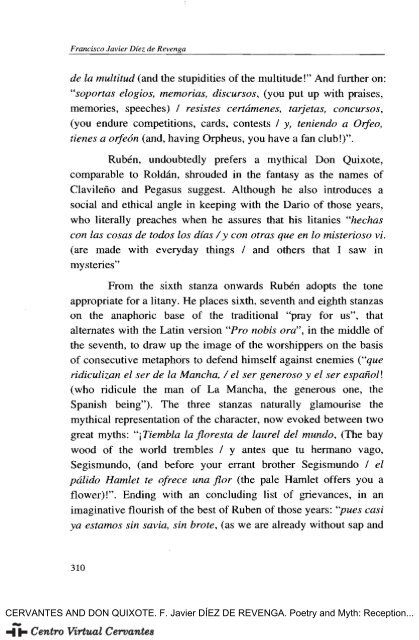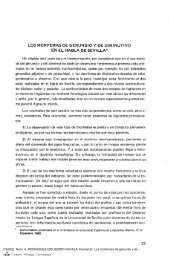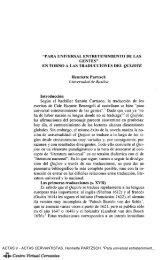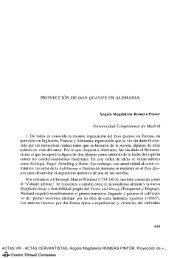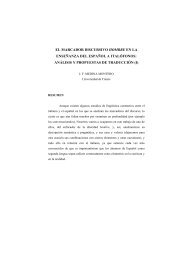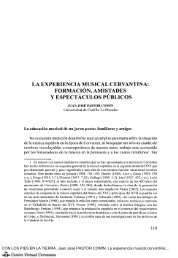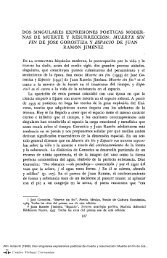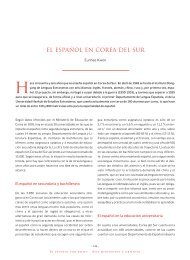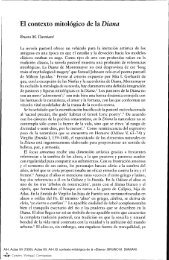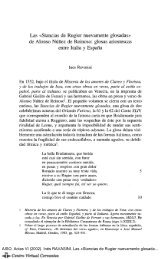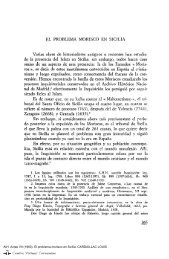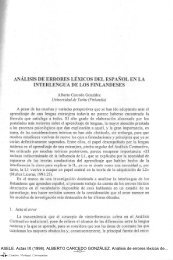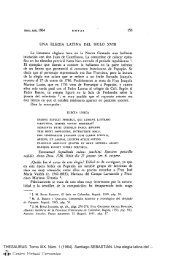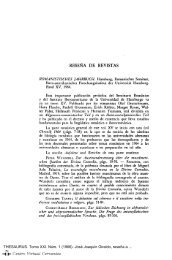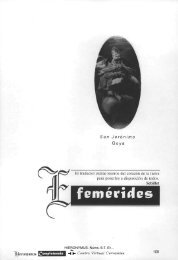Create successful ePaper yourself
Turn your PDF publications into a flip-book with our unique Google optimized e-Paper software.
Francisco Javier<br />
de la multitud (and <strong>the</strong> stupidities <strong>of</strong> <strong>the</strong> multitude!" And fur<strong>the</strong>r on:<br />
"soportas elogios, memorias, discursos, (you put up with praises,<br />
memories, speeches) I resistes certámenes, tarjetas, concursos,<br />
(you endure competitions, cards, contests I y, teniendo a Orfeo,<br />
tienes a orfeón (and, hav<strong>in</strong>g Orpheus, you have a fan club!)".<br />
Rubén, undoubtedly prefers a mythical Don Quixote,<br />
comparable to Roldán, shrouded <strong>in</strong> <strong>the</strong> fantasy as <strong>the</strong> names <strong>of</strong><br />
Clavileño and Pegasus suggest. Although he also <strong>in</strong>troduces a<br />
social and ethical angle <strong>in</strong> keep<strong>in</strong>g with <strong>the</strong> Dacio <strong>of</strong> those years,<br />
who literally preaches when he assures that his litanies "hechas<br />
con las cosas de todos los días / y con otras que en lo misterioso vi.<br />
(are made with everyday th<strong>in</strong>gs I and o<strong>the</strong>rs that 1 saw <strong>in</strong><br />
mysteries"<br />
Prom <strong>the</strong> sixth stanza onwards Rubén adopts <strong>the</strong> tone<br />
appropriate for a litany. He places sixth, seventh and eighth stanzas<br />
on <strong>the</strong> anaphoric base <strong>of</strong> <strong>the</strong> traditional "pray for us", that<br />
altemates with <strong>the</strong> Latín version "Pro nobis ora", <strong>in</strong> <strong>the</strong> middle <strong>of</strong><br />
<strong>the</strong> seventh, to draw up <strong>the</strong> image <strong>of</strong> <strong>the</strong> worshippers on <strong>the</strong> basis<br />
<strong>of</strong> consecutive metaphors to defend himself aga<strong>in</strong>st enemies ("que<br />
ridiculizan el ser de la Mancha, / el ser generoso y el ser español!<br />
(who ridicule <strong>the</strong> man <strong>of</strong> La Mancha, <strong>the</strong> generous one, <strong>the</strong><br />
Spanish be<strong>in</strong>g"). The three stanzas naturally glamourise <strong>the</strong><br />
mythical representation <strong>of</strong> <strong>the</strong> character, now evoked between two<br />
great myths: "j Tiembla la floresta de laurel del mundo, (The bay<br />
wood <strong>of</strong> <strong>the</strong> world trembles I y antes que tu hermano vago,<br />
Segismundo, (and before your errant bro<strong>the</strong>r Segismundo I el<br />
pálido Hamlet te <strong>of</strong>rece una flor (<strong>the</strong> pale Hamlet <strong>of</strong>fers you a<br />
flower)!". End<strong>in</strong>g with an conclud<strong>in</strong>g list <strong>of</strong> grievances, <strong>in</strong> an<br />
imag<strong>in</strong>ative flourish <strong>of</strong> <strong>the</strong> best <strong>of</strong> Ruben <strong>of</strong> those years: "pues casi<br />
ya estamos s<strong>in</strong> savia, s<strong>in</strong> brote, (as we are already without sap and<br />
310


